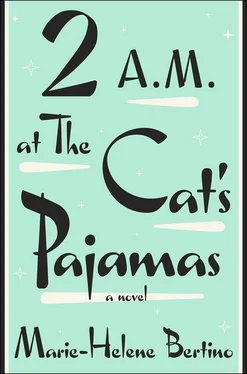Madeleine stares through the window into the courtyard. On most days she feels something staring back: a God or a mother-shaped benevolent force. Today, nothing reciprocates. The streamers on the chained bicycles lift in the indifferent breeze. She is alone in old stockings she’s repaired twice but still run. Life will be nothing but errands and gray nights.
Madeleine cries. Cries more when she asks herself what she could be doing while the tea is brewing, more when she fastens the clothespin onto her nose, more when she remembers the word ungrateful , more when she thinks of the caramel apples. She longs to hear her mother’s voice: a round, dulcet sound, ridged with spice. Madeleine pities her classmates, whose mothers’ voices are wry or weak, eliciting no allegiance from family members or vendors no matter how loud they yell. Madeleine’s mother was, at her quietest, her most powerful. Her voice could reverse the terms of every unfair transaction.
She thumbs through her mother’s recipe box for anything that will help: HOW TO SEW A BUTTON, HOW TO MAKE WRAPPING RIBBON INTO CURLICUES, HOW TO CHECK CAR OIL, HOW TO TALK ABOUT A BOOK YOU HAVEN’T READ.
Finally, she finds:
HOW TO GET OVER THE POETIC HORRORS,
Ice cream
Chocolate
Whiskey
Nina Simone, “Live at the Village Gate”
Dance
National Geographic
Get your hair and nails done
Sing
Madeleine brings her tea to the mirror where a girl with a freshly bowled haircut stares back. All she sees is nose. She adjusts the clothespin. She selects a record and waits for the song to begin.
Hey there, you with the stars in your eyes .
It is impossible to be sad when she is singing, even if the song she’s singing is sad. She marks “You with the Stars in Your Eyes” down in her notes. C minus.
She wants to keep practicing, but she is tired. Pedro is loose in the city. Her father is fastened to his room, with his records and his drugs and his quiet. She crawls under her covers. It is her fault for triggering one of his spells. At least it had been brief. She knows most girls do not have to deal with a father like hers. Most girls would be scared of his fits, and the way she lives, lawless in a roachy apartment. Madeleine would be scared too, she thinks, falling asleep. If she had only experienced finished basements and dads who acted like dads. But Madeleine loves her father, and how can you be scared of someone you love?
Sarina chooses a bottle of wine for the party at the corner store. Tinsel glints on the door and windows. The tree in the produce aisle revolves on its pedestal, reflecting red and silver light onto whoever buys grapes. “Surfer Girl” plays on the overhead speakers and everyone Sarina passes in the aisles is singing.
Good-bye, children, good-bye. Tucked into your buses, secured into the hands of your parents or guardians on the approved list of who can pick you up . Principal Randles walks the halls of Saint Anthony, tapping off lights and shutting doors. Except for the art projects that flutter in her wake, nothing moves. The chalk dust has settled.
In her office, Principal Randles pours a glass of single malt. At home, a sink full of dishes and a poster of Paris at night. On Christmas she will volunteer at the convent, collecting the old nuns’ drool with cheap napkins.
What had the Altimari girl said? Santa doesn’t exist , with the same flip tone her mother, Corrine, had. Like her mother, this girl has no appreciation for a principal’s job. Someone has to enforce lines and ring bells and guide and discipline. The way that woman walked, like she was paying the sidewalk a favor. She hadn’t believed Corrine would actually die. But what had the girl called her? A bitch rag?
Principal Randles is going on a date tonight with a tax attorney who described himself on his profile as a culinary enthusiast. Ha-ha , she says to the empty office. Bitch rag, indeed. She wears a new dress the color of cornflowers and they are going to a restaurant whose patrons eat in plastic, glowing pods. She wants to show off the legs she maintains with Olympian discipline.
Principal Randles stands in the doorway to the main office, mood buoying. She watches her secretary, Regina, count pretzel money, all the hemming and hawing parts of her; the unexplained bag of yarn, the Christmas gifts heaped upon her in card, ceramic, and doodad form, the battery-powered vest that exclaims: HAPPY HOLIDAYS! Then goes quiet. HAPPY HOLIDAYS! Then goes quiet. Regina is in teaching for the outfits. By her elbow a pile of erasers waits to be clapped.
“Regina.” The principal wags her scotch. “Go home.”
“But the erasers.”
“Forget them.”
The secretary has too many bags, so the principal follows her through the schoolyard to her sagging Nissan. She watches Regina drive out of the parking lot, the reflection of her vest insisting HAPPY HOLIDAYS! against the windshield.
A figure crouches near the trees that border the yard.
“Who is that?” she calls.
It is a boy she doesn’t recognize. He considers her, then scurries away. She walks to where he had been kneeling. A line of trees dusted with dead leaves. A piece of chalk, a drained soda can, and a phrase written on the asphalt.
BITCH
Mindless graffiti, she assures herself, backhanding a stray tear from her cheek.
Lorca sits at his desk, stabbing Mrs. Santiago’s sausage out of its container with a plastic fork. Mongoose will come in later to buy the Snakehead. The club will be saved, Sonny will roil, spring will come, and maybe by then Lorca will shake the feeling of sliding down a hill of ice that gets steeper as he falls, reaching out for anything substantial but finding ice, and ice, and ice.
Mongoose, the traitor. The desk phone rings. It is Gray Gus, five years earlier, calling to tell Lorca about a girl he’s just met.
He, Mongoose, and Sonny had chased a promoter’s late-night oath to Chicago. Charlie Roads went with them, a childhood friend of Gus’s who was a bookie and a drug dealer.
The promoter sets the boys up with a gig playing The C Note three times a week. Gus meets a girl from the South Side named Alessandra. She writes her name and number on a piece of paper and it takes up the whole page in A’s and S’s. Everything is that name Alessandra. He rides the El. Alessandra. He buys the paper to check the box scores. Alessandra. The street kids slap playing cards into the spokes of their bike wheels. Al-es-san-dra. He carries her number around for a week before he calls her.
Alessandra has ten brothers and sisters. She is a neighborhood girl, a gem. Gus decides she can follow him out of those slums like a star. He calls Lorca late at night from pay phones all around Chicago to say words like alabaster and resplendent , the relief of her perfect face.
“Are you having a stroke?” Lorca says.
Charlie convinces Gus to take bets on horses. Charlie has a wife and little boy, so Gus gives him the lion’s share when they win. Gus doesn’t care about money, as long as he has enough for his fix and a pack of cigars to smoke during his gigs at The C Note. But instead of taking care of his family, Charlie places bigger bets with more seasoned dealers. “Reinvesting,” he calls it. He loses, and begins to dodge a bookie named Leland.
Gus was born with a Hollywood chin, a butter touch, and an ear that can hear rhythms tapped out from Neptune. In another life he would have been drumming in Johnny Carson’s band, drinking water out of a mug. But in this one he has a disease and he can’t say no to shysters like Charlie, who uses his wife and kid to cheat on Gus’s lousy, glowing heart.
Читать дальше












